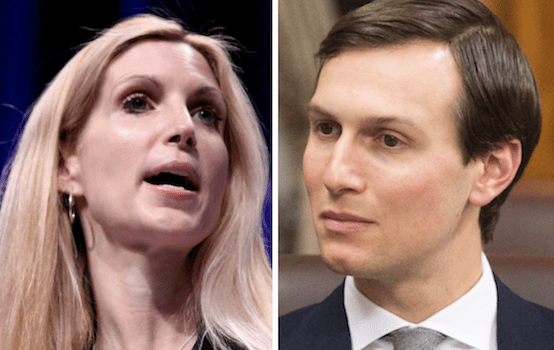Trump’s Immigration Choice: Kushner or Coulter?

President Donald Trump was elected on a platform of America policing its own borders, not the world. His reelection may depend on how well he has fulfilled those campaign promises, which distinguished him from the bipartisan political class he so eloquently described as the swamp.
So far, the results are not encouraging. While Trump campaigned against regime change in the Middle East, his administration has been coy about whether the authorization of military force to respond to the 9/11 attacks covers toppling the government of Iran mere days after labeling the Islamic Revolutionary Guard Corps a terrorist organization. Meanwhile, the situation at the border is deteriorating, with the number of illegal crossings approaching the bad old days of the early to mid-2000s. More of these immigrants are likely staying in the country as the composition of new migrant inflows increasingly shifts from single men to families with children.
Single men can be more easily detained and quickly removed from the United States. Families with children and unaccompanied minors face a different set of rules—and, as the White House learned last year, create a different set of political problems.
One key difference remains, however: on foreign policy, Trump is receiving advice almost exclusively from officials whose instincts run counter to the “America First” agenda from the 2016 campaign. On immigration and border security, there is more of a split. That’s why there’s so much at stake in Trump’s recent immigration shake-up.
The ouster of Homeland Security Secretary Kirstjen Nielsen and her deputy Claire Grady has been widely reported as an example of senior advisor Stephen Miller consolidating control of his immigration portfolio. But it may not be Miller time just yet. The moves come after Jared Kushner, the senior advisor who is also Trump’s son-in-law, has been pushing a plan to increase legal immigration.
Trump has praised Miller as “excellent,” “wonderful,” and “brilliant,” but clarified that he alone runs the show on immigration. (It’s possible that some of the sourcing for stories putting Miller’s fingerprints all over the Nielsen sacking actually came from his own enemies inside the White House.) Trump described Kushner’s unannounced immigration ideas as “very exciting, very important.” The president recently called for increased immigration himself, ad-libbing this line in his last State of the Union address: “I want people to come into our country in the largest numbers ever, but they have to come legally.”
Yet a bill Trump endorsed at the White House last year would eventually cut legal immigration in half. Freshman Senator Josh Hawley joined Trump-aligned Senators Tom Cotton and David Perdue to reintroduce this bill in an apparent attempt to thwart Kushner’s coming push to expand immigration. On the stump, Trump has railed against “chain migration” and picking immigrants by “lottery” rather than a “merit-based system.” But like a lot of Republicans, he tends to focus on legality versus illegality, rather than the number and composition of immigrants entering the country overall.
There was a point last year when a sufficient number of Democrats—mostly red-state senators up for reelection that November, like Hawley’s since-vanquished opponent Claire McCaskill—might have voted to fund Trump’s border wall in exchange for the reinstatement of Barack Obama’s amnesty for young illegal immigrants who arrived in the country as minors. The White House, on advice often attributed to Miller, floated a different compromise. Amnesty would be provided for an even larger number of young undocumented immigrants in exchange for the legal immigration reforms in the Cotton-Perdue RAISE Act and border security measures including wall funding.
Politically, trading the wall for Dreamers would have given Trump a high-profile border victory at the cost of a much smaller amnesty than the Gang of Eight plan. The failure to take that deal, assuming Democrats would have actually accepted it, will always be regarded as a mistake. On the merits, however, there were strong reasons to offset the amnesty with immigration cuts elsewhere while adopting reforms that would make it less likely we would be debating yet another legalization program for undocumented minors a few years later.
In one of the many examples of how this president has unsettled our politics, David Frum, author of the Never Trump screed Trumpocracy, endorsed precisely this policy mix in an important cover story for The Atlantic. Frum’s piece appeared at roughly the same time that Ann Coulter, author of In Trump We Trust, was excoriating Trump for failing to keep his immigration promises and filling his administration with people who constantly undermine them.
Frum, regardless of my other disagreements with him, has stuck to his skepticism of uninterrupted mass immigration despite his profound alienation from the Trump-era GOP. Coulter, ridiculed for her pro-Trump polemics during the campaign, has actually done far more to hold the president accountable than most denizens of MAGA-land (she was also more prescient about the election than most of those sneering at her). It was Frum, in a prior Atlantic piece, who credited Coulter, in a previous book, with opening Trump’s eyes to the force of the immigration issue.
Trump and Coulter are now estranged over precisely this issue. The White House palace intrigue matters. Does Francis Cissna stay or go? Does Kris Kobach have a chance at DHS? Will Julie Kirchner join Miller or does Ken Cuccinelli come aboard? But another question is even more important.
If given the chance for a wall and an amnesty do-over, is the average Trump voter closer to Kushner or Coulter?
W. James Antle III is editor of The American Conservative.
Comments